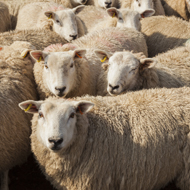Bluetongue vaccine to become available in the UK

The company expects the vaccine, which has been used in Europe for a number of years, to become available in the UK in mid-July.
A vaccine for bluetongue virus (BTV) has been made available by MSD Animal Health, following recent concerns that a vaccine would not be available to British vets and farmers in time to prevent the disease getting a stronghold in the UK.
There is an 80 per cent chance that BTV will reach southern parts of the UK in late summer, as a result of infected midges being blown across from France, according to a recent risk assessment by the Animal and Plant Health Agency.
MSD Animal Health has signed an agreement with the Spanish-based biopharmaceutical specialist CZ Veterinaria SA (CZV), to distribute its bluetongue vaccine (BLUEVAC BTV8) throughout Great Britain.
John Atkinson, MSD vet and technical manager, said: "Bluetongue is an increasing threat to cattle and sheep in Europe, including the UK. This agreement means that we can help meet farmers’ needs later this summer – more quickly than we can fast track manufacture and supply of our own vaccine.
"Conveniently, BLUEVAC BTV8 is licensed for both cattle and sheep, and can be used during pregnancy. All animals should be given a primary course of two injections under the skin, three weeks apart. The immunity afforded by the vaccine lasts for a year after completion of the primary course."
The company expects the vaccine, which has been used in Europe for a number of years, to become available in the UK in mid-July. It is currently in talks with UK industry bodies and vets in practice to agree upon the most effective rollout of the vaccine to protect cattle and sheep in the most vulnerable parts of the country.
Farmers that are concerned about local threats facing their flocks are advised to speak to their vet.



 With Strangles Awareness Week just around the corner (5-11 May), vets are being encouraged to share a survey about the disease with their horse-owning clients.
With Strangles Awareness Week just around the corner (5-11 May), vets are being encouraged to share a survey about the disease with their horse-owning clients.